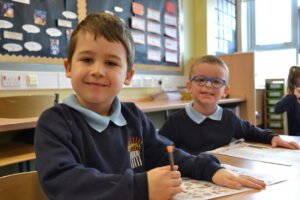Curriculum

Curriculum for Excellence 3-18
Curriculum for Excellence has been introduced to raise standards of learning and teaching for all 3 to 18 year olds. It aims to help prepare children and young people with the knowledge and skills they need in a fast changing world. As part of Curriculum for Excellence all children from pre-school to the end of S3 will receive a rounded education known as a Broad General Education(BGE). Curriculum for Excellence is all about bringing real life into the classroom and taking lessons beyond it.
Through the experiences we provide at Cranhill Primary School we want our children to become Successful Learners, Confident Individuals, Responsible Citizens and Effective Contributors. We are committed to providing children with a broad general education and focus on eight curriculum areas.
| Expressive Arts | Health & Wellbeing | Languages | Mathematics |
| Religious & Moral | Sciences | Social Studies | Technologies |
Progress in learning is indicated through curriculum levels as detailed below.
| Level | Stage |
| Early | The pre-school years and P1 or later |
| First | To the end of P4, but earlier or later for some |
| Second | To the end of P7, but earlier or later for some |
| Third & Fourth | S1-S3, but earlier for some |
Expressive arts: The inspiration and power of the arts play a vital role in enabling our children and young people to enhance their creative talent and develop their artistic skills.
Health and wellbeing: Learning in health and wellbeing ensures that children and young people develop the knowledge, understanding and skills which they need now and in the future to help them with their physical, emotional and social wellbeing.
Science: Science and its practical application in healthcare and industry is central to our economic future, for our health and wellbeing as individuals and as a society.
Social Studies: Through social studies, children and young people develop their understanding of the world by learning about other people and places both past and present, societies, their beliefs and values.
Religious and moral education: Religious and moral education includes learning about Christianity, Islam and other world religions, and supports the development of beliefs and values.
Languages: Knowing other languages and understanding other cultures is a 21st century skill set for students as they prepare to live and work in a global society.
Mathematics: Mathematics equips us with the skills we need to interpret and analyse information, simplify and solve problems, assess risk and make informed decisions.
Technologies: The range of subjects in technical education has changed significantly over the last two decades and now includes craft, design, engineering and graphics.
There will be opportunities throughout the year for parents and carers to learn more about aspects of the curriculum and to be consulted about significant changes if appropriate.
